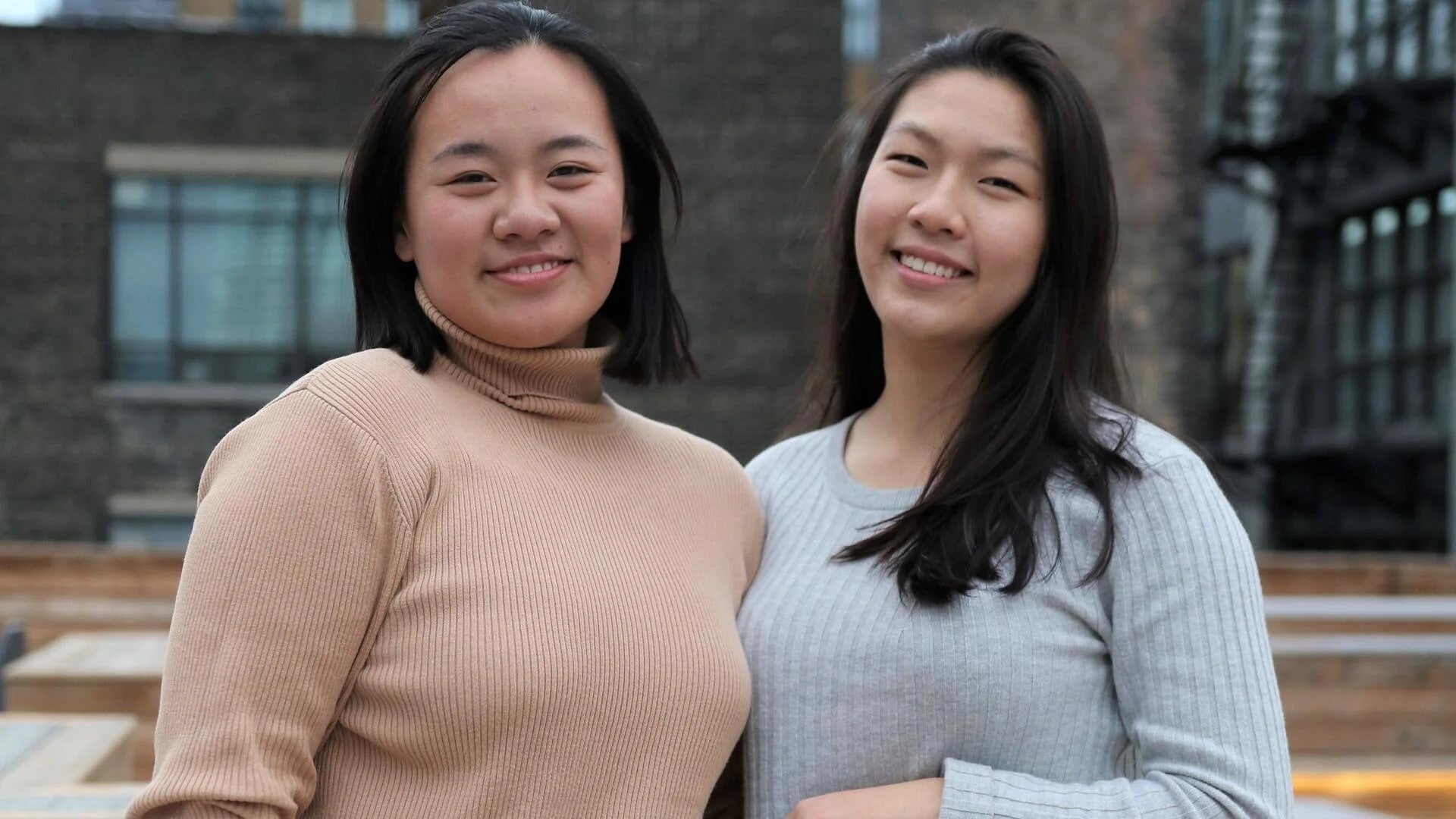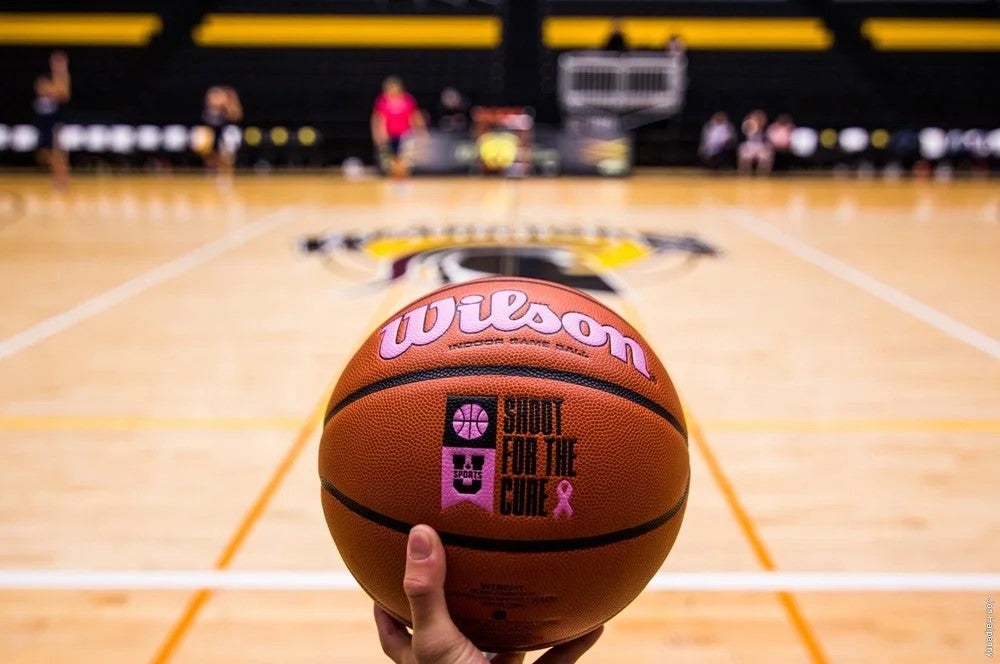Editor:
Brandon Sweet
University Communications
bulletin@uwaterloo.ca
Crying out loud

By Brian Caldwell. This article was originally published on Waterloo News.
Leslie Xin and Queenie Wu don’t mind admitting now that they did a lot of crying during their first year as engineering students at the University of Waterloo.
But at the time, feeling alone and overwhelmed by all the new demands placed on them, they were both so ashamed of their tears that they hid them.
That changed as Xin and Wu became close friends and learned they had actually struggled with many of the same emotions.
“Queenie and I bonded over the mutual fact that we have cried a lot on campus,” said Xin. “Realizing that someone else went through something similar was incredibly comforting and reassuring.”
Two years later, the friends are now drawing on their experiences in an innovative project called Waterworks to share the benefits of sharing strong emotions and let other students know they aren’t alone either.
Heat map shows campus crying
Xin and Wu, both 21, combined their interests in art and engineering to create a heat map of campus showing places students have cried, with links to a representative sample of stories on the circumstances behind those tears.
Data was collected by asking students in an anonymous Reddit forum where and why they have cried, as well as what helped them feel better and other related questions.
Xin and Wu were surprised to receive over 300 initial responses and there have been 100 more since the project received media coverage this week. Students have also inquired about making their own maps at other universities.
The idea for the project grew out of weekly art sessions Xin and Wu use to socialize via video while separated by COVID-19. They hope their map project, which includes suggested resources for people who may be in need of more assistance, helps other students feel more connected too.
'Illustrates the idea of being together'
“It’s something that unites us and really illustrates the idea of being together,” Wu said. “Especially at a time when we are physically isolated, the idea that we have shared this space before is something we hope is really powerful.”
Submissions so far include students who cried in the library under the stress of first-year exams, in a lab after pulling an all-nighter and, for good reasons, in a lecture hall after meeting former Canadian astronaut Chris Hadfield.
Now in their third year of the systems design engineering program, the friends stress crying is a universal experience, not something to be ashamed of, and that it is triggered by a full range of normal human emotions.
“Crying is really a very healthy way to begin dealing with how you are feeling and begin talking about it,” said Wu, who grew up thinking tears were a sign of weakness. “We want to normalize that. It shouldn’t just be that you reach out during a crisis, when you’re having a breakdown.”
Q and A with the experts: One year of COVID-19 in Canada

The University of Waterloo has a number of experts available for comment on various aspects of the COVID-19 pandemic.
January 25, 2021 marks one year since the first case of COVID-19 was confirmed in Canada.
We asked public health expert Professor Zahid Butt to take us through what we’ve learned about COVID-19 in the year that has passed, and what we still need to learn to beat the virus.
What do we know now about COVID-19 that we didn’t know one year ago?
A few things: the first is that COVID-19 affects all segments of the society and all ages, although the severity of the disease is worse in the elderly and less in children. It also affects marginalized and racialized populations disproportionately, which may be the result of socio-economic disparities and the fact that most of these vulnerable populations work in jobs that make them more likely to contract the virus.
Second, we know that there could be several variants of the virus, some of which are more transmissible from person to person than others. Third, mounting scientific evidence suggests that the SARS-Cov-2 virus does have airborne transmission via aerosols.
Finally, we cannot take a chance with this virus; if it finds any space to transmit from person to person, it will infect and spread very rapidly between populations, so we have to be vigilant and follow public health guidelines strictly.
What do we still need to learn about the virus?
The burning issue now is whether the available vaccines will protect against all the variants of the virus. Another factor is how long is the acquired immunity against the virus; current research puts it around five to seven months, but we are still not sure. An ongoing debate is whether a person can pass the virus to another person after getting vaccinated. There is currently no answer to this question. We also need to learn why some people experience prolonged symptoms of COVID-19, also known as “Long COVID.” Another gap in our knowledge is whether there is a seasonal variation to COVID-19.
Where do you think we will be in terms of controlling the virus one year from now, both in Canada and globally?
There is no clear answer to this. For Canada, it would depend on how fast and how much of the population is vaccinated during the year 2021. Also, it would depend on how strictly people follow public-health guidelines and the type, severity, and duration of restrictions put in place by public health authorities. Furthermore, muti-sectoral and multi-pronged strategies are required to tackle this virus, including economic, social and political support from both the private and public sector.
Globally, a massive coordinated public health effort is required, which would include coordination and resource sharing, including technical, human, and logistical support such as vaccine supply and distribution between developed and developing countries. This would require governments, national and international public health agencies, and donor agencies to work together to achieve the goal of controlling the virus.
Zahid Butt is an assistant professor in the School of Public Health and Health Systems. His research interests include a focus on the syndemics of infectious diseases like HIV, hepatitis B and C, tuberculosis and sexually transmitted infections. His research aims to evaluate the determinants of syndemics, extend the syndemic framework to non-communicable diseases and cancers, and design and evaluate prevention strategies to address syndemics.
Waterloo professor joins Earth Leadership Program's North American cohort

University of Waterloo Professor Nandita Basu has joined the cohort of 2021-2022 Earth Leadership Program fellows.
Basu, an associate professor, water sustainability and ecohydrology in Earth and Environmental Sciences, is one of 21 members of the North American cohort of the Earth Leadership Program, the global successor to the renowned Leopold Leadership Program, now held in partnership with Future Earth.
Professor Basu studies the role of humans play in modifying water availability and quality through changing land use and climate, providing innovative solutions to water sustainability challenges.
The Earth Leadership Program provides outstanding academic researchers with the skills, approaches, and theoretical frameworks for catalyzing change to address the world’s most pressing sustainability challenges, emphasizing new forms of individual and collective leadership. The program enables scientists to work collaboratively with diverse stakeholders and become agents of change within and beyond their universities.
"This year’s North America cohort is composed of 21 passionate academics working within a wide array of disciplines related to sustainability, from marine biology to atmospheric chemistry, governance, and economics," says a statement from the Earth Leadership Program. "The fellows, who come from 11 U.S. states, Canada, and Mexico, are committed to pursuing transdisciplinary work that brings together scientific disciplines, government representatives, private sector voices, and civil society to build a more sustainable future for all."
The Earth Leadership Program’s fellowship training model is built around a collaborative approach that values co-design with diverse stakeholders, and prepares participants to develop and execute transdisciplinary projects. As fellows, the cohort first comes together for a retreat training session that focuses on leadership skills, community-building, and personal reflection. The fellows then spend a year practicing and applying their new knowledge and skills. The following June, the fellows reconvene in a final session to integrate their learning from the practice year, learn new tools, and articulate to each other their refined visions for knowledge to impact.
Thursday's notes

The deadline for applications for the Writing and Communication Centre's Speak like a Scholar series is tomorrow at 5:00 p.m.
"Apply to Speak like a Scholar to learn the skills needed for designing, practising, revising, performing, and answering tough questions for your presentations or defending your dissertation," says a note from WCC. "The program runs from Monday, February 22, 2021 to Tuesday, March 2, 2021."
Note that this program is open to doctoral students only. Space in this workshop is limited, and participants will be selected based on their applications.

The Warriors Think Pink (Shoot for the Cure) Campaign is currently running from February 1 to 7. Join your fellow Warriors for free online HIIT Classes, Esports Tournament and hair cutting as they create awareness and raise funds for the Breast Cancer Cause at the Canadian Cancer Society. Find out more about the campaign.
Link of the day
When and Where to get support
Students can visit the Student Success Office online for supports including academic development, international student resources, leadership development, exchange and study abroad, and opportunities to get involved.
Instructors can visit the Keep Learning website to get support on adapting their teaching and learning plans for an online environment.
Updated Course templates are now available within your course in LEARN to help you build and edit your content and assignment pages quickly. Support for Winter 2021 is available.
The following workshops, webinars, and events are offered by the KL team (CTE, CEL, ITMS, LIB):
Independent Remote Course Design Essentials. Self-directed, continuous self-enrollment course in LEARN.
Getting Ready to Facilitate Online Courses: TA Training, Monday, January 18, 2021, 8:30 a.m. to Friday, February 12, 4:30 p.m.
Introduction to Bongo Video Assignment (Technical Session), Friday, February 5, 1:00 p.m. to 2:00 p.m.
Employees can access resources to help them work remotely, including managing University records and privacy of personal information. Here are some tips for staying healthy while working from home.
Stay informed about COVID cases on campus by consulting the COVID case tracker.
Whether you’re a student or faculty member, the Writing and Communication Centrehas virtual services and programs to help you with all of your academic writing needs. This term we have added evening and weekend one-to-one appointments with our peer tutors, and our NEW one-to-one workshops, where you can learn the content directly from one of our writing advisors.
- Undergraduates: Work with us to brainstorm, draft, revise, and polish your assignments in one-to-one appointments. Ask questions and learn writing tips at our Instagram Live Q&A sessions, and beat isolation while improving your writing skills at the weekly PJ-friendly writing groups.
- Graduates: Meet with our advisors in one-to-one appointments. Join the online writing community at the Virtual Writing Cafés, learn how to present your work at Speak Like a Scholar, or get moving on your dissertation at Dissertation Boot Camp.
- Faculty and Instructors: Request custom workshops for your courses, join the Waterloo writing community at the Virtual Writing Cafés, or make progress on your article, book, or chapter in one-to-one meetings with our faculty specialist.
We understand that these circumstances can be troubling, and you may need to speak with someone for emotional support. Good2Talk is a post-secondary student helpline based in Ontario, Canada that is available to all students. If you feel overwhelmed or anxious and need to talk to somebody, please contact the University’s Campus Wellness services, either Health Services or Counselling Services. You can also contact the University's Centre for Mental Health Research and Treatment.
The Library has published a resource guide on how to avoid information overload.
The Faculty Association of the University of Waterloo (FAUW) continues to advocate for its members. Check out the FAUW blog for more information.
The University of Waterloo Staff Association (UWSA) continues to advocate for its members. Check out the UWSA blog for more information.
The Indigenous Initiatives Office is a central hub that provides guidance, support, and resources to all Indigenous and non-Indigenous campus community members and oversees the university Indigenization strategy.
WUSA supports for students:
Peer support (Visit https://wusa.ca/peersupport to book an appointment):
- MATES – Available Monday to Friday, 10:30 a.m. to 9:30 p.m.; Saturday and Sunday, 10:30 a.m. to 5:30 p.m. (online only)
- Support sessions available in the following languages: Cantonese, English, Hindi, Mandarin, Portuguese, Punjabi, Spanish, and Urdu.
- Glow Centre – Available Monday to Friday, 4:00 p.m. to 8:00 p.m. (online only)
- RAISE – Available Monday to Friday – Varied hours (online only)
- Women’s Centre – Available Monday to Friday, 2:00 p.m. to 5:00 p.m. (online only)
Bike Centre – Will be reopening soon. Check https://wusa.ca/bikecentre for current operating times.
Campus Response Team, ICSN, Off Campus Community and Co-op Connection all available online. Check https://wusa.ca for more details.
Food Support Service food hampers are currently available from the Turnkey Desk on weekdays from 7:30 a.m. to 7:00 p.m. in the Student Life Centre. If you have any questions please email us at foodsupport@wusa.ca.
Centre for Academic Policy Support - CAPS is here to assist Waterloo undergraduates throughout their experience in navigating academic policy in the instances of filing petitions, grievances and appeals. Please contact them at caps@wusa.ca. More information at https://wusa.ca/services/centre-academic-policy-support-caps.
WUSA Commissioners who can help in a variety of areas that students may be experiencing during this time:
- Equity – equity@wusa.ca
- Co-op and Experiential Affairs – coop.affairs@wusa.ca
WUSA Student Legal Protection Program- Seeking legal counsel can be intimidating, especially if it’s your first time facing a legal issue. The legal assistance helpline provides quick access to legal advice in any area of law, including criminal. Just call 1-833-202-4571.
Empower Me is a confidential mental health and wellness service that connects students with qualified counsellors 24/7. They can be reached at 1-833-628-5589.
When and Where (but mostly when)
Healthy Warriors at Home. Free programming including Online Fitness, Health Webinars, Personalized Nutrition and more from Warriors Athletics and Rec. Open to students, staff, faculty and alumni. Register today.
Renison English Language Institute continues to offer virtual events and workshops to help students practice their English language skills.
Warriors vs. Laurier Blood Donation Battle. Join your fellow Warriors, donate blood and help us win the Blood Battle against Laurier for a second year in a row. Set up a profile or add the PFL code: UNIV960995 to your account if you have a blood.ca account already. Questions? Contact WarriorsInfo@uwaterloo.ca.
Warrior Rec Free Programs for Students, January to February.Wide range of free opportunities available to keep students active and healthy including:Fitness Classes (On-Demand), Health and Mindfulness Webinars, Personalized Nutrition Guides, Personal Training Consultations, Small Group Training and Warrior Reset. Register today.
Drop-in to Warrior Virtual Study Halls on Wednesdays from 5:30 p.m. to 7:00 p.m. Come together in this virtual space to set goals and work independently or in groups each week.
Warriors truLOCAL Kickback Program, January 20 to February 20. Support your Warriors varsity teams by purchasing a pre-set truLOCAL box filled with the best quality locally sourced meat and fish. Find out more information and purchase a box today.
Warriors Think Pink (Shoot for the Cure) Campaign, Monday, February 1 to Sunday, February 7. Join your fellow Warriors for free online HIIT Classes, Esports Tournament and hair cutting as we create awareness and raise funds for the Breast Cancer Cause at the Canadian Cancer Society. Find out more now.
WIN Member Seminar Series: Hamed Shahsavan, Thursday, February 4, 1:00 p.m.
Virtual Writing Café, Friday, February 5, 8:00 p.m.
Intellectual Property Presentation Series - IP101 & Commercialization, Friday, February 5, 1:00 p.m. to 2:30 p.m., virtual event through WebEx, register today.
Managing Personal Wellness in a Global Pandemic: Breaking Free From Low Mood, Tuesday, February 9, 10:00 a.m.
Managing Personal Wellness in a Global Pandemic: Motivating Yourself Through Habit Change, Tuesday, February 9, 2:00 p.m.
English Conversation Circles, Tuesday, February 9, 3:00 p.m.
Concept Working Session: Building a Canvas for Your Business, Tuesday, February 9, 5:30 p.m., virtual event.